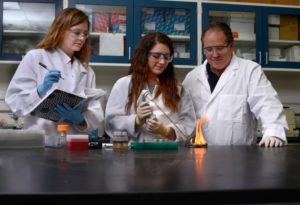
Press Release: On June 1, 2015, Dr. Wade Jeffrey became director of the University of West Florida’s Center for Environmental Diagnostics and Bioremediation. A veteran professor of the Center, Jeffrey first came to UWF as a research assistant in 1991, moving through a series of promotions before assuming the leadership role.
Jeffrey’s training as an oceanographer with an emphasis on the effects of ultraviolet radiation on marine microorganisms has afforded him the opportunity to travel extensively to some of the earth’s most extreme environments – including both polar oceans and driest deserts – but his focus the past five years has been at home on the Gulf Coast. Since the Deepwater Horizon Oil Spill, the CEDB has been heavily involved with researching the effects of the disaster.
In his new role, Jeffrey will oversee the operations of the Center as it strives for excellence in teaching, research and service at UWF.
“Our goals are to maintain strong extramurally funded research programs, and develop collaborations and partnerships within UWF, the region, national and international scientific communities,†Jeffrey stated. “My job as director is to facilitate the creation and support for the best research and learning opportunities for our faculty, staff and students.â€
Jeffrey intends to uphold the level of excellence for which CEDB is known, as originated by its first director, Dr. K. Ranga Rao, and continued by Jeffrey’s predecessor, Dr. Richard Snyder.
His initial objective is to examine CEDB and UWF resources to maximize productivity and student opportunities.
“My vision is to add several new faculty to bring diverse state-of-the-art expertise to CEDB and campus,†Jeffrey said. “These new skills will increase our ability to address interdisciplinary scientific needs and build partnerships with local, regional, national and international scientific agencies.â€
A recent reorganization of academic units of the University placed the CEDB within the College of Science, Engineering & Health, which Jeffrey hopes will allow the Center to better integrate its strategic priorities with those of the college and university.
Oil spill related research is still at the forefront, while new projects and funding continue to come in. Updates shared by Dr. Jeffrey include:
Dr. Jane Caffrey of CEDB and Dr. Will Patterson of the Dauphin Island Sea Lab have been awarded a project by the Florida RESTORE Act Center of Excellence program to evaluate the ecosystem impacts and production associated with artificial reefs. Dr. Caffrey is also part of a large project looking at coastal water quality issues.
Dr. Joe Lepo is currently in China building an international program involving water quality and agricultural microbiology.
In 2015, UWF entered into a Memorandum of Understanding with the National Park Service to create the Gulf Islands Research and Education Center, helmed by Dr. Jeff Eble. This program has great potential to create opportunities for students and faculty not only within universities, but also in K-12 classrooms.
As for his own projects, Jeffrey is working to build international programs with scientists in Chile, France and Scotland. Additionally, he hopes to return to Antarctica to continue the University’s microbial ecology work there.
“I would like to see us as the leaders in research opportunities for students, and our activities will include creating hands-on scientific research experiences whenever possible,†Jeffrey said.
To learn more about the CEDB, please visit www.uwf.edu/cseh/departments/biology/cedb.